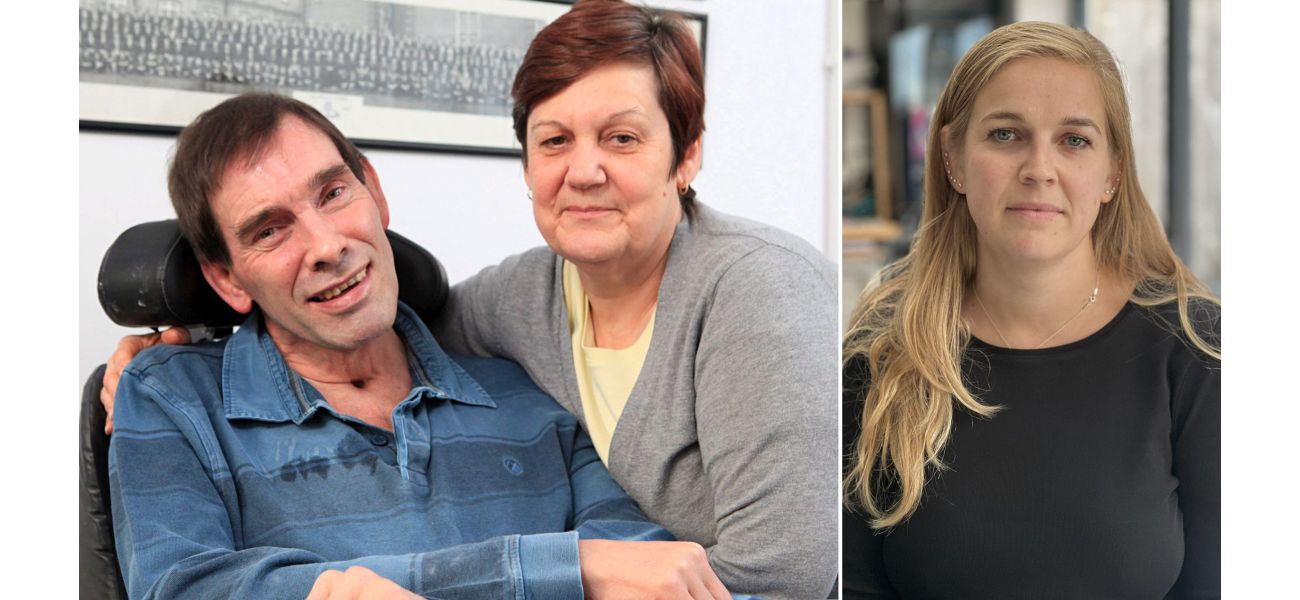Advocate for assisted dying would be furious about slow advancement of the cause.
Man with locked-in syndrome dies after court denies right-to-die request.
October 13th 2024.

Tony Nicklinson was a man who suffered greatly after a stroke left him with locked-in syndrome. His daughter, Lauren Peters, shared that her father, a strong advocate for the right to die, would have been deeply disappointed with the lack of progress made in the 12 years since his passing. As the Assisted Dying Bill was set to be introduced to parliament, Lauren spoke out, determined to keep her father's story alive in hopes of helping others in similar situations.
In 2005, Tony's life was forever changed when a devastating stroke paralyzed him from the neck down and took away his ability to speak. His family described it as being buried alive. Despite his challenging condition, Tony remained a dedicated father and husband until his death in 2012, just days after his right-to-die appeal was rejected by the High Court.
Lauren reflects on her father's passing with sadness and frustration, knowing that he would have been outraged by the current state of the assisted dying legislation. She questions how much more suffering must occur before people realize the need for this compassionate option. She is one of the many signatories on a letter urging for the inclusion of those who are suffering unbearably in the bill, not just those with a terminal illness.
As the details of the bill have not yet been disclosed, some have expressed concerns that it may only apply to those with a terminal illness. Lauren, along with others, believe that the law should also consider adults of sound mind who are suffering with an incurable physical condition and have a clear and settled wish to die.
While acknowledging the need for strict regulations, Lauren believes it is possible to have a system in place that supports individuals like her father while still protecting those who need it. She points out that other countries have successfully implemented assisted dying laws and believes it can work in the UK as well. Lauren knows that her father would have been livid about the potential missed opportunity if the bill does not include those suffering unbearably.
She urges MPs to think broadly and bravely about the issue, not just dismissing it as too difficult. She encourages them to speak to their constituents, do their research, and read her father's story and the stories of others who have suffered immensely. She believes that it is easy to underestimate the intensity of suffering when it has not been experienced firsthand, and that is why it is crucial to have compassion and support for those who need it.
On the other hand, opponents argue that legalizing assisted dying could lead to people feeling pressured to end their lives against their will. They also emphasize the importance of improving and ensuring equal access to palliative care. Catholic leader, Cardinal Vincent Nichols, has expressed his opposition to the proposed changes and has urged Catholics to write to their MPs in opposition as well.
As the Assisted Dying Bill is set to be introduced to parliament, MPs must listen to the voices of those directly affected and make a decision with compassion and understanding. If the bill passes, it will go through further stages before becoming a law. In the meantime, Lauren and others will continue to speak out and share their stories, hoping for a change that will bring peace and dignity to those who are suffering unbearably.
In 2005, Tony's life was forever changed when a devastating stroke paralyzed him from the neck down and took away his ability to speak. His family described it as being buried alive. Despite his challenging condition, Tony remained a dedicated father and husband until his death in 2012, just days after his right-to-die appeal was rejected by the High Court.
Lauren reflects on her father's passing with sadness and frustration, knowing that he would have been outraged by the current state of the assisted dying legislation. She questions how much more suffering must occur before people realize the need for this compassionate option. She is one of the many signatories on a letter urging for the inclusion of those who are suffering unbearably in the bill, not just those with a terminal illness.
As the details of the bill have not yet been disclosed, some have expressed concerns that it may only apply to those with a terminal illness. Lauren, along with others, believe that the law should also consider adults of sound mind who are suffering with an incurable physical condition and have a clear and settled wish to die.
While acknowledging the need for strict regulations, Lauren believes it is possible to have a system in place that supports individuals like her father while still protecting those who need it. She points out that other countries have successfully implemented assisted dying laws and believes it can work in the UK as well. Lauren knows that her father would have been livid about the potential missed opportunity if the bill does not include those suffering unbearably.
She urges MPs to think broadly and bravely about the issue, not just dismissing it as too difficult. She encourages them to speak to their constituents, do their research, and read her father's story and the stories of others who have suffered immensely. She believes that it is easy to underestimate the intensity of suffering when it has not been experienced firsthand, and that is why it is crucial to have compassion and support for those who need it.
On the other hand, opponents argue that legalizing assisted dying could lead to people feeling pressured to end their lives against their will. They also emphasize the importance of improving and ensuring equal access to palliative care. Catholic leader, Cardinal Vincent Nichols, has expressed his opposition to the proposed changes and has urged Catholics to write to their MPs in opposition as well.
As the Assisted Dying Bill is set to be introduced to parliament, MPs must listen to the voices of those directly affected and make a decision with compassion and understanding. If the bill passes, it will go through further stages before becoming a law. In the meantime, Lauren and others will continue to speak out and share their stories, hoping for a change that will bring peace and dignity to those who are suffering unbearably.
[This article has been trending online recently and has been generated with AI. Your feed is customized.]
[Generative AI is experimental.]
0
0
Submit Comment





